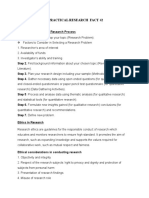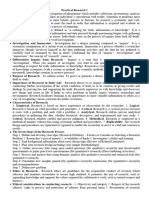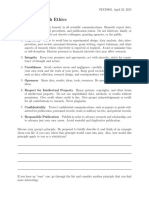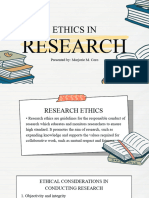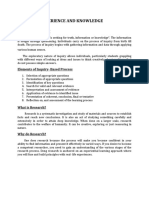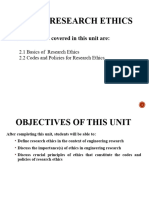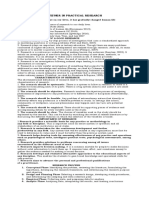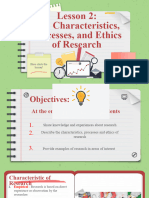Theoretical and Conceptual Frameworks
Theoretical and Conceptual Frameworks
Uploaded by
Liana HoCopyright:
Available Formats
Theoretical and Conceptual Frameworks
Theoretical and Conceptual Frameworks
Uploaded by
Liana HoCopyright
Available Formats
Share this document
Did you find this document useful?
Is this content inappropriate?
Copyright:
Available Formats
Theoretical and Conceptual Frameworks
Theoretical and Conceptual Frameworks
Uploaded by
Liana HoCopyright:
Available Formats
1.
4 Theoretical and Conceptual Framework
Thursday, 27 January 2022 7:34 am
Theoretical Framework
- a framework based on an existing theory in a field of inquiry that is learned and/or
reflects the hypothesis of a study
Steps to Create a Theoretic Framework
1. Identify your key concepts
2. Evaluate and explain relevant theories
3. Show how your research fits in
Example
Conceptual Framework
- It is the researcher’s explanation of how the research problem would be explored
Example
Research Ethics
Ethical Considerations in Qualitative Research
RES01 (Practical Res 1) Page 1
Ethics
- It is the part of human philosophy concerned with appropriate conduct and virtuous
living (Given, 2008).
Importance of Ethics in Research:
1. To protect research participants’ rights and welfare, and reduce the risk of
physical and psychological discomfort, damage, and/or threats appearing
because of research procedures;
2. To protect the rights of the researchers to carry out a lawful research and
reputation of the university implementing or supporting research;
3. To reduce the probability of claims for negligence against specific researchers,
universities, and all cooperating persons or organizations;
12 Ethical Principles
Honesty Integrity Openness
Objectivity Carefulness Respectful for Intellectual
Confidentiality Social Responsibility Competence
Legality Animal Care Human Subjects Protections
1. Honesty
- Honestly report data, results, methods and procedures, and publication status.
Do not fabricate, falsify, or misrepresent data.
2. Objectivity
- Strive to avoid bias in experimental design, data analysis, data interpretation,
peer review, personnel decisions, grant writing, expert testimony, and other
aspects of research.
3. Integrity
- Keep your promises and agreements; act with sincerity; strive for consistency of
thought and action.
If you interview for 30 minutes, you stick to it only with the exact time.
As well as 5 questions, it should only be like that.
4. Carefulness
- Avoid careless errors and negligence; carefully and critically examine your own
work and the work of your peers. Keep good records of research activities.
Reread your records and the things you will put in your research because
whatever you will commit there, it is documentated now.
5. Openness
- Share data, results, ideas, tools, resources. Be open to criticism and new ideas.
Once shared to everyone, not everything that is good to you is good for
everyone. Be open to improve.
6. Respectful for Intellectual Property
- Honor patents, copyrights, and other forms of intellectual property. Do not use
unpublished data, methods, or results without permission. Give credit where
credit is due. Never plagiarize.
7. Confidentiality
- Protect confidential communications, such as papers or grants submitted for
publication, personnel records, trade or military secrets, and patient records
RES01 (Practical Res 1) Page 2
publication, personnel records, trade or military secrets, and patient records
8. Social Responsibility
- Strive to promote social good and prevent or mitigate social harms through
research, public education, and advocacy.
9. Competence
- Maintain and improve your own professional competence and expertise through
lifelong education and learning; take steps to promote competence in science.
10. Legality
- Know and obey relevant laws and institutional and governmental policies.
11. Animal Care
- Show proper respect and care for animals when using them in research. Do not
conduct unnecessary or poorly designed animal experiments.
12. Human Subjects Protection
- When conducting research on human subjects, minimize harms and risks and
maximize benefits; respect human dignity, privacy, and autonomy.
Misconducts of Research
1. Fabrication
- - You make up data or results before reporting them
2. Falsification
- You manipulate or omit the data/results gathered. It will not become accurate
and affects the whole research
3. Plagiarism
- - Inappropriation of someone else's ideas, thoughts, words without credit
- Even if the result is common, still report it
Application of Research Ethics
Importance of Ethics in Qualitative Research
Remember
1. Consider codes of ethics (ethical principles)
2. Have participants sign informed consent forms.
3. Obtain and secure necessary permissions;
When you need apointments and select a site with interest; example is
during face to face and when meeting them, if they prefer starbucks
But in an online situation, be considerate now. If you have zoom whereas
they don't, adjust for them.
4. Select a site without vested interests
5. Negotiate authorship for publication
Elements of Informed Consent Form
Sarantakos (2005, in Creswell, 2018)
▪ Identification of the researcher
▪ Identification of the institution
▪ Identification of the purpose of the study
▪ Identification of the benefits for participating
▪ Identification of the level and type of participant involvement
RES01 (Practical Res 1) Page 3
▪ Identification of the level and type of participant involvement
▪ Notation of risks to the participant
▪ Guarantee of confidentiality to the participant
▪ Assurance that the participant can withdraw at any time
▪ Provision of names of persons to contact if questions arise
References
Creswell, J. W. & Creswell, J. D. (2018). Research design: qualitative, quantitative,
and mixed methods approaches (5th ed.). Sage Publications.
Given, L. M. (Ed.) (2008). The SAGE encyclopedia of qualitative research methods.
Sage Publications.
Shamoo, A. & Resnik, D. (2009). Responsible conduct of research (2nd ed.).
Oxford University Press.
RES01 (Practical Res 1) Page 4
You might also like
- Tony Robbins ISM'S NOTES FROM UPWDocument9 pagesTony Robbins ISM'S NOTES FROM UPWtruzan 21100% (1)
- Nature of Inquiry and ResearchDocument6 pagesNature of Inquiry and ResearchLyra Lang-ayan AgustoNo ratings yet
- PR1 Lesson 2Document4 pagesPR1 Lesson 2Norania MacarayaNo ratings yet
- Characteristics and Ethics in ResearchDocument2 pagesCharacteristics and Ethics in ResearchGwen MonjeNo ratings yet
- PR1Document12 pagesPR1bendanomarky8No ratings yet
- Fact Sheet 2Document4 pagesFact Sheet 2Celesty JasminNo ratings yet
- Lesson 2Document2 pagesLesson 2Annalie Delera CeladiñaNo ratings yet
- Lesson 2Document6 pagesLesson 2silvaeddisoiNo ratings yet
- The Characteristics, Processes, and Ethics of Research: Start!Document41 pagesThe Characteristics, Processes, and Ethics of Research: Start!Ivy Mae SagangNo ratings yet
- The Characteristic, Process and Ethics of ResearchDocument38 pagesThe Characteristic, Process and Ethics of Researchrizal.teacher05No ratings yet
- Practical Research 1Document3 pagesPractical Research 1ai vyNo ratings yet
- PR1 - Lecture Notes - Lesson 1 and 2Document8 pagesPR1 - Lecture Notes - Lesson 1 and 2Christian DalmacioNo ratings yet
- PPT-PR1-Nature of Inquiry CHARACTERISTICSDocument61 pagesPPT-PR1-Nature of Inquiry CHARACTERISTICSstephanie maloloyonNo ratings yet
- Ethics: Research EthicsDocument3 pagesEthics: Research EthicsAllan Oliver PollienteNo ratings yet
- Nature of Inquiry and ResearchDocument6 pagesNature of Inquiry and ResearchBLOCK 1 - ALLAWANNo ratings yet
- Practical Research 1 - Week 2Document9 pagesPractical Research 1 - Week 2Danilo Siquig Jr.No ratings yet
- Practical Research 1 CompressDocument14 pagesPractical Research 1 CompressAngela AbenesNo ratings yet
- Full Practical Research 1 2024Document52 pagesFull Practical Research 1 2024Beverly Centino IINo ratings yet
- Lesson 2: The Characteristics, Processes, and Ethics of ResearchDocument5 pagesLesson 2: The Characteristics, Processes, and Ethics of ResearchCory Bulawit Silva-LasdoceNo ratings yet
- Lesson 2 PR1Document25 pagesLesson 2 PR1Clarenz Ken TatierraNo ratings yet
- Ethics in ResearchDocument10 pagesEthics in ResearchMarjorie CoroNo ratings yet
- Nature of ResearchDocument6 pagesNature of ResearchMarie PauliteNo ratings yet
- PR1 Reviewer 3rd QuarterDocument11 pagesPR1 Reviewer 3rd Quarterfranzaaaron12No ratings yet
- Module 1Document4 pagesModule 1Florens Genoves BagatNo ratings yet
- Practical Research 1 NotesDocument12 pagesPractical Research 1 Notesmialicera3No ratings yet
- RESEARCH-Nature Types ProcessesEthics-ReviewDocument34 pagesRESEARCH-Nature Types ProcessesEthics-ReviewCERVERO MORGAN THIRDNo ratings yet
- 1st 2 WeeksDocument6 pages1st 2 Weeksyaji FerellaNo ratings yet
- Lesson 2Document12 pagesLesson 2jmNo ratings yet
- Nature of Inquiry and ResearchDocument10 pagesNature of Inquiry and ResearchMarvin CanamanNo ratings yet
- PR 1Document11 pagesPR 1Brull BanjawanNo ratings yet
- 2 Characteristics Process and Ethics of ResearchDocument16 pages2 Characteristics Process and Ethics of ResearchE.J. DiezNo ratings yet
- The Nature of Inquiry and ResearchDocument33 pagesThe Nature of Inquiry and ResearchJuliet HipolitoNo ratings yet
- PRACTICAL RESEARCH 1 Module 2-4Document9 pagesPRACTICAL RESEARCH 1 Module 2-4Pats MinaoNo ratings yet
- Unit 2 Research EthicsDocument17 pagesUnit 2 Research Ethicsesubalew molalgnNo ratings yet
- Reviewer PR 1Document16 pagesReviewer PR 1Aseana EscotoNo ratings yet
- PRACTICAL RESEARCH 1 FinalDocument115 pagesPRACTICAL RESEARCH 1 FinalMark Steven Del RosarioNo ratings yet
- Practical Research1reportDocument39 pagesPractical Research1reportvindelubyooNo ratings yet
- Research EthicsDocument12 pagesResearch EthicsMonica TianelaNo ratings yet
- Lesson 3 - Characteristics, Processes and Ethics of ResearchDocument2 pagesLesson 3 - Characteristics, Processes and Ethics of ResearchKassandra KayNo ratings yet
- Research Ethics, Plagiarism and FraudDocument53 pagesResearch Ethics, Plagiarism and FraudWisnu Adi SaputroNo ratings yet
- Practical Research 1: Quarter 1 - WEEK 3Document15 pagesPractical Research 1: Quarter 1 - WEEK 3marjun catanNo ratings yet
- Research EthicsDocument3 pagesResearch EthicsKermit GooeyNo ratings yet
- Ethics of ResearchDocument2 pagesEthics of ResearchAl-najer JuddinNo ratings yet
- Reviewer in Practical ResearchDocument6 pagesReviewer in Practical ResearchTerence DelmundoNo ratings yet
- The RationaleDocument27 pagesThe Rationalerizza.comeNo ratings yet
- Lesson 2 The Characteristics, Processes, and Ethics of ResearchDocument20 pagesLesson 2 The Characteristics, Processes, and Ethics of ResearchDanicaAnnStaRosaNo ratings yet
- Intro ResearchDocument13 pagesIntro ResearchLance Go LlanesNo ratings yet
- Lesson 01 - Nature and Inquiry of ResearchDocument5 pagesLesson 01 - Nature and Inquiry of ResearchDaphne BautistaNo ratings yet
- Chapter 7 Ethics in ResearchDocument12 pagesChapter 7 Ethics in ResearchGatluak Thalow KuethNo ratings yet
- Practical Research 2 First Semester - Quarter 2 Week 5-6 Learning Activity Sheets (LAS)Document4 pagesPractical Research 2 First Semester - Quarter 2 Week 5-6 Learning Activity Sheets (LAS)Janelkris PlazaNo ratings yet
- Research Module 2 CHARACTERISTICS, PROCESSES, AND ETHICS IN RESEARCHDocument2 pagesResearch Module 2 CHARACTERISTICS, PROCESSES, AND ETHICS IN RESEARCHcandy lollipoNo ratings yet
- Lesson 1 PR1Document11 pagesLesson 1 PR1Mark Joseph GarciaNo ratings yet
- Module 7Document6 pagesModule 7Marjorie QuitorNo ratings yet
- Lesson 5 Ethics in ResearchDocument28 pagesLesson 5 Ethics in ResearchAiza San Pedro SantosNo ratings yet
- SLK 1 PR1Document15 pagesSLK 1 PR1Shielorie Dela CruzNo ratings yet
- Practical Research 1: Nature, Characteristics, Strengths, Weaknesses, and Ethics of ResearchDocument6 pagesPractical Research 1: Nature, Characteristics, Strengths, Weaknesses, and Ethics of ResearchPriscaly Ann CastilloNo ratings yet
- Research Ethics ArticleDocument2 pagesResearch Ethics Articlesiddam maneendraNo ratings yet
- Practical Research 1Document105 pagesPractical Research 1shalom.cargoNo ratings yet
- CPE of ResearchDocument30 pagesCPE of ResearchElla Jane AugustoNo ratings yet
- RESEARCH PointsDocument10 pagesRESEARCH Pointszeemal tayyab100% (1)
- MathDocument34 pagesMathLiana HoNo ratings yet
- EnglishDocument54 pagesEnglishLiana HoNo ratings yet
- ElectiveDocument35 pagesElectiveLiana HoNo ratings yet
- Social ScienceDocument40 pagesSocial ScienceLiana HoNo ratings yet
- Basic Skills of VolleyballDocument2 pagesBasic Skills of VolleyballLiana HoNo ratings yet
- CHM01 Stoichiometry NotesDocument7 pagesCHM01 Stoichiometry NotesLiana HoNo ratings yet
- Understanding CultureDocument2 pagesUnderstanding Culture'aleXandy OchavilloNo ratings yet
- Literacy in MathematicsDocument15 pagesLiteracy in MathematicsVanessa Graves Foster100% (1)
- Modern Plant Maintenance and Reliability ManagemenDocument13 pagesModern Plant Maintenance and Reliability ManagemenVinoth KumarNo ratings yet
- AdlerDocument12 pagesAdlerGayle Malitic MagoNo ratings yet
- Lesson Plan in English Grade 4 TTLDocument3 pagesLesson Plan in English Grade 4 TTLVhone NeyraNo ratings yet
- The Silk Road 2011Document92 pagesThe Silk Road 2011Maria MarinovaNo ratings yet
- MR Research Methodology GR (Fanya, Indah, Tesa)Document19 pagesMR Research Methodology GR (Fanya, Indah, Tesa)Muhammad farhanNo ratings yet
- Automatic Grapheme - To - Phoneme Conversion of Arabic TextDocument8 pagesAutomatic Grapheme - To - Phoneme Conversion of Arabic TextAbbas YerimaNo ratings yet
- What Is Interview: Interview Is Formal Meetings Between Two People (The Interviewer and TheDocument9 pagesWhat Is Interview: Interview Is Formal Meetings Between Two People (The Interviewer and TheCarla CarlaNo ratings yet
- Clue MovieDocument3 pagesClue Movieapi-515370726No ratings yet
- Class8worksheetch4aianswers PDFDocument2 pagesClass8worksheetch4aianswers PDFblack.agx900No ratings yet
- Mythbusters AssignmentDocument6 pagesMythbusters Assignmentapi-160095725No ratings yet
- Theory Into PracticeDocument2 pagesTheory Into PracticeMartha Miller KaufeldtNo ratings yet
- Hypnotherapy-Dr Dar-2020Document142 pagesHypnotherapy-Dr Dar-2020Rao Harri100% (1)
- ADHD and Your Teens: Behavior ManagementDocument1 pageADHD and Your Teens: Behavior ManagementKida7No ratings yet
- Technology EssayDocument2 pagesTechnology Essayapi-255085484No ratings yet
- Course: General Science in Schools (8638) Semester: Spring, 2020 Assignment No. 2 Q. 1 Develop A Lesson Plan Based On 5E Teaching Model From 7 Or8 Class Science. AnsDocument19 pagesCourse: General Science in Schools (8638) Semester: Spring, 2020 Assignment No. 2 Q. 1 Develop A Lesson Plan Based On 5E Teaching Model From 7 Or8 Class Science. Ansgulzar ahmadNo ratings yet
- Braconnier-Siper2021 Article NeuropsychologicalAssessmentInDocument9 pagesBraconnier-Siper2021 Article NeuropsychologicalAssessmentInJéssica VialNo ratings yet
- Example Essays-Nursing StudentsDocument20 pagesExample Essays-Nursing StudentsFArah DiAnaNo ratings yet
- Lesson 1 Nature of CommunicationDocument14 pagesLesson 1 Nature of CommunicationMs. Ludie MahinayNo ratings yet
- Interpreting Black Box Models: A Review On Explainable Artificial IntelligenceDocument30 pagesInterpreting Black Box Models: A Review On Explainable Artificial Intelligencesilverstudios19No ratings yet
- Group Work As An Incentive For Learning - Students' Experiences of Group WorkDocument10 pagesGroup Work As An Incentive For Learning - Students' Experiences of Group WorkAvinashNo ratings yet
- CMP List of Course Providers - August 19Document13 pagesCMP List of Course Providers - August 19NazrinNo ratings yet
- Anthropology ActivityDocument2 pagesAnthropology ActivityHRSS External Affairs Associate Vice PresidentNo ratings yet
- Alberto Giordano: Otas Sobre Diarios de EscritoresDocument11 pagesAlberto Giordano: Otas Sobre Diarios de EscritoresVinicio ManotoaNo ratings yet
- Thesis Proposal 3.editedDocument12 pagesThesis Proposal 3.editedGis Siti Rodrigo SevillaNo ratings yet
- English Teacher InterviewDocument4 pagesEnglish Teacher Interviewankush456100% (1)
- REPORTING - PEER EVALUATION - QuijadaDocument2 pagesREPORTING - PEER EVALUATION - QuijadaWest QuijadaNo ratings yet
- Narrative Report FS2 Deployment - MillanoDocument4 pagesNarrative Report FS2 Deployment - MillanoCelyn MillanoNo ratings yet






